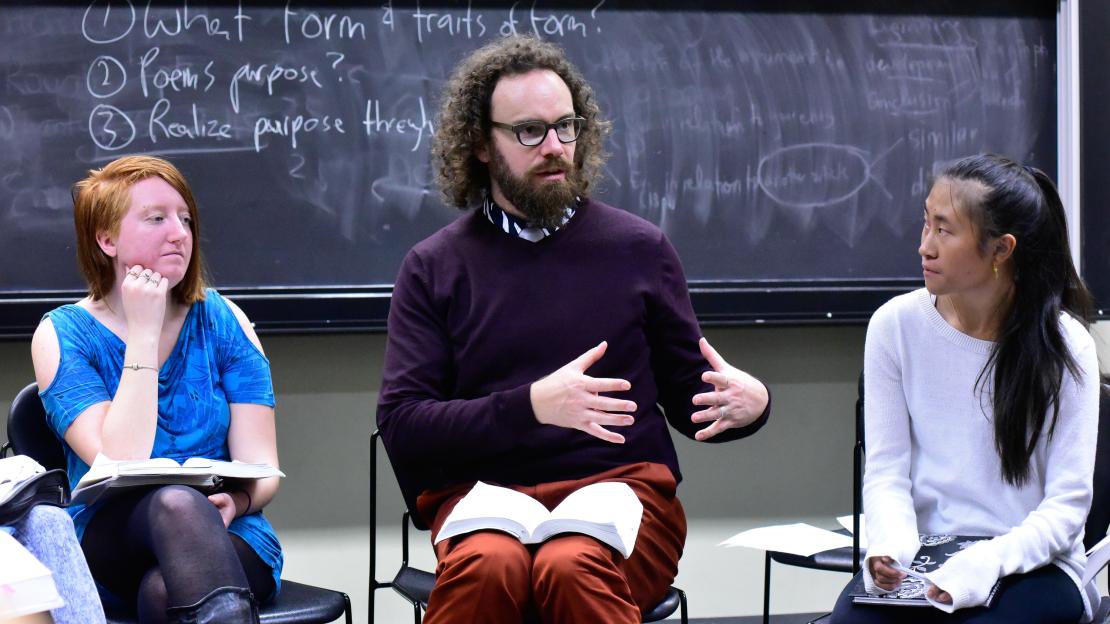U of T Scarborough students have a unique opportunity to enrol in a new creative writing major – one of a few programs of its kind in Canada.
“Students gain expertise in three main areas of knowledge, with each of these categories, of course, containing a million different skills,” says Daniel Scott Tysdal, an associate professor and supervisor of the creative writing program.
“They learn to write, they learn how to succeed in the writing profession, and they learn to be caring and committed members of the writing community.”
Launched in fall 2020, the major provides even more possibilities for students to be immersed in creative writing. Expanding on the creative writing minor, the major program offers even more courses to help students discover new genres and develop their own writing styles.
“Creative classes are discussion-, writing-, and workshop-based courses,” Tysdal says. “We want the students to gain their skills through hands-on experience, and we also want to nurture their dedication to their craft and to one another.”
According to Tysdal, feedback and engagement are huge components of all courses, and students get to learn how to deliver and receive constructive feedback.
“One key component of this class is helping students compose and organize their creative writing major and minor applications,” Tysdal says. “Every student who applies has been given the tools and assistance to compose the strongest possible portfolio.”
Tysdal says that professors aren’t looking for polished portfolios as they know that students are only beginning their journey as creative writers. Instead, they want to see the potential and commitment.
While the major has only been offered since last year, all upper-years are welcomed to enrol into the program by submitting a course-specific portfolio. Many students already followed this procedure and graduated with a major in creative writing.
Two fourth-year students shared why they decided to apply to the creative writing major.
“A creative writing program has a sort of intimacy, a sense of mentorship,” says Eric Wang, who received an accounting degree before deciding to double-major in English and creative writing.
“It’s being able to learn not only from the profs, who are absolutely brilliant, but also students who share the same passion.”
Noah Farberman, who came to UTSC to study creative writing after attending Humber College for two years, appreciates the faculty expertise and desire to help students beyond the classroom.
“Every professor of creative writing specifically is very open and very willing to not only talk about your course material, but I go and show them outside writing that I’ve been working on. They are incredibly helpful in encouraging us to work on other stuff, which I think is very rare to find.”
Recently, the department of English announced the appointment of two new faculty members — Kateri Akiwenzie-Damm and Randy Lundy, who have expertise in Indigenous Literatures and Oral Traditions.
“There’s a whole new rich dimension to creative writing that they [students] will discover at the UTSC that you just couldn’t find anywhere else,” says Neil ten Kortenaar, chair of the English department.
In addition to practical courses, the creative writing students have many opportunities to be involved on-campus.
“Beyond the classroom, we lead creative writing club, the UTSC creative writing group, which is open to all UTSC students, and is highlighted by weekly meetings and wonderful field trips to venues like TIFF and the AGO,” Tysdal says.
Creative writing graduates went on to work in many different industries, including but not limited to publishing, law, academia, TV, and art.
“One of the exciting things about being a writer is that you can fully commit to the calling or write and publish while pursuing a different career path,” Tysdal adds.
Neil ten Kortenaar emphasized that the curriculum is comprehensive, and this program is designed not only for people interested in publishing their works.
“The focus is about creativity, about developing one’s own voice, developing creative skills for releasing the imagination,” Kortenaar says."So, it’s for everyone with an interest in precisely being creative.”
